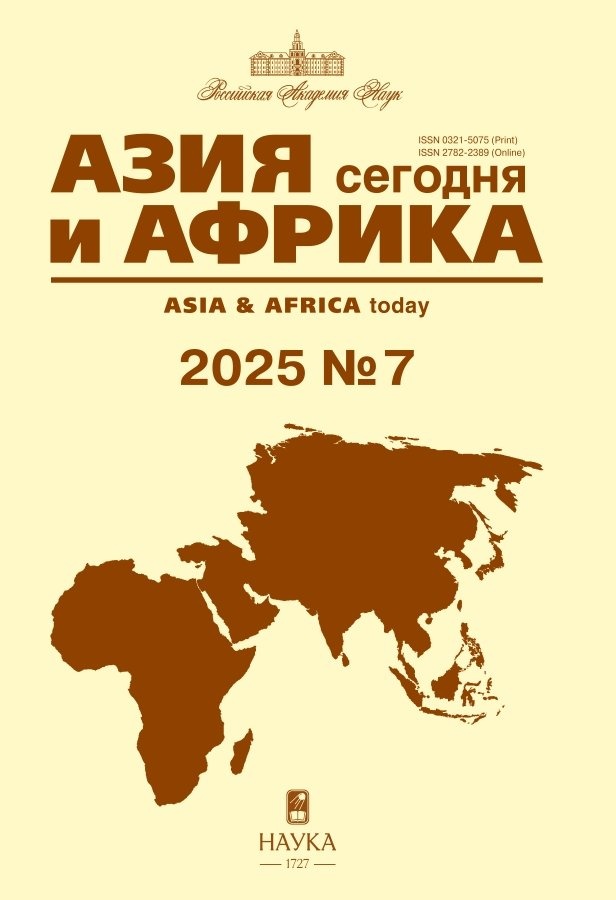Political Islam in Afghanistan: At the Service of the Government and the Armed Opposition from 2014 till the Second Seizure of Power by the Taliban
- Autores: Sazhenov N.D1
-
Afiliações:
- MGIMO University
- Edição: Nº 7 (2025)
- Páginas: 13-20
- Seção: Politics, economics
- URL: https://bulletin.ssaa.ru/0321-5075/article/view/686852
- DOI: https://doi.org/10.31857/S0321507525070033
- ID: 686852
Citar
Texto integral
Resumo
Political Islam has been one of the most important but attendant factors of the civil war in Afghanistan. The last phase of the existence of the Islamic Republic of Afghanistan (in 2014–2021, during Ashraf Ghani’s presidency), which ended with the second seizure of power in the country by the Taliban, was not an exception. Political Islam was instrumental for both parties to military conflict (the government and the armed opposition) in the context of the power struggle. Both parties underpinned by political Islam their own victory claims and assertions to keep or assume power respectively. Kabul primarily invoked to political Islam via national Ulama Council in support of its policy. The armed opposition used political Islam to prove Government’s illegitimacy and justify the necessity of fighting against the Republican regime. The results of this period of civil war in Afghanistan showed that insurgents’ Islamic rhetoric had turned out to be more effective in terms of propaganda and political mobilization. It was one of the reasons for the fall of the Republican Government in Afghanistan in 2021.
Palavras-chave
Bibliografia
- Johnson T. Taliban Narratives: The Use and Power of Stories in the Afghanistan Conflict. Kabul. 2019. 415 p. (In Pers.)
- Johnson T. The Afghan Taliban and the Peace Negotiations: Are the Taliban “De-radicalising”? In Ashour O. (ed.), Bullets to Ballots: Transformations from Armed to Unarmed Activism. Edinburgh University Press. May 2021. Pp. 153–185.
- Johnson T., Steele K. The Taliban Narrative: Understanding the Group’s Messages, Actions and Clues to Their Endgame. In Corman S. (ed.), Narrating the Exit from Afghanistan. Center for Strategic Communication. Tempe, Ari-zona, USA. 2013. Pp. 71–98.
- Johnson T. The Taliban Insurgency and an Analysis of Shabnamah (Night Letters). Small Wars and Insurgencies. Vol. 18, № 3. September 2007. Pp. 317–344.
- Ragozina S.A. 2013. Discourse of Political Islam (Using the example of Northeastern Caucasus Cyber-Space). Mos-cow. 144 p. (In Russ.)
- Landa R.G. 2005.
- Malashenko A. Political Islam (video). 01.02.2013. https://postnauka.ru/video/7785 (accessed 12.01.2025)
- Osman B. 2012. The Ulama Council: Paid to Win Public Minds – But Do They? Afghanistan Analysts Network. 7 p.
- Sirat H. Afghan Ulama Claimed about their Support to the Government. Deutsche Welle. 01.09.2015. (In Pers.).
- Constable P. Afghanistan’s Presidential Elections Delayed Until July. The Washington Post. 30.12.2018. https://washingtonpost.com/world/asia_pacific/afghanistans-presidential-elections-delayed-until-july/2018/12/30/038faea0-0c45-11e9-8f0c-6f878a26288a_story.html (accessed 05.01.2025)
- Speeches by President Ghani. Т. 1. Kabul, 2018. 419 p. (In Pers.)
- Taieb R. Ulema’s Indonesia Meeting Supports Afghanistan’s Peace Efforts. TOLO News. 11.05.2018. https://tolonews.com/afghanistan/ulema-meeting-indonesia-issue-declaration-against-terrorism (accessed 12.01.2025)
- Solaiman. Ulama in Saudi Arabia: The Taliban War is Forbidden by the Almighty God. Salaam Times. 13.07.2018. (In Pers.). https://afghanistan.asia-news.com/prs/articles/cnmi_st/features/2018/07/13/feature-01 (accessed 12.01.2025)
- Mielke K., Miszak N. Jihadi-Salafism in Afghanistan – Beyond Taliban, Al-Qaeda and Daesh. Bonn International Center for Conversion. Policy Brief, 6/2017. 6 p.
- Ibrahimi Niamatullah, Omer Musab, Irfani Mohammad. Social Media and Articulation of Radical Narratives in Afghanistan. Afghanistan Institute of Strategic Studies. November 2015, Kabul, Afghanistan. 68 p.
Arquivos suplementares










